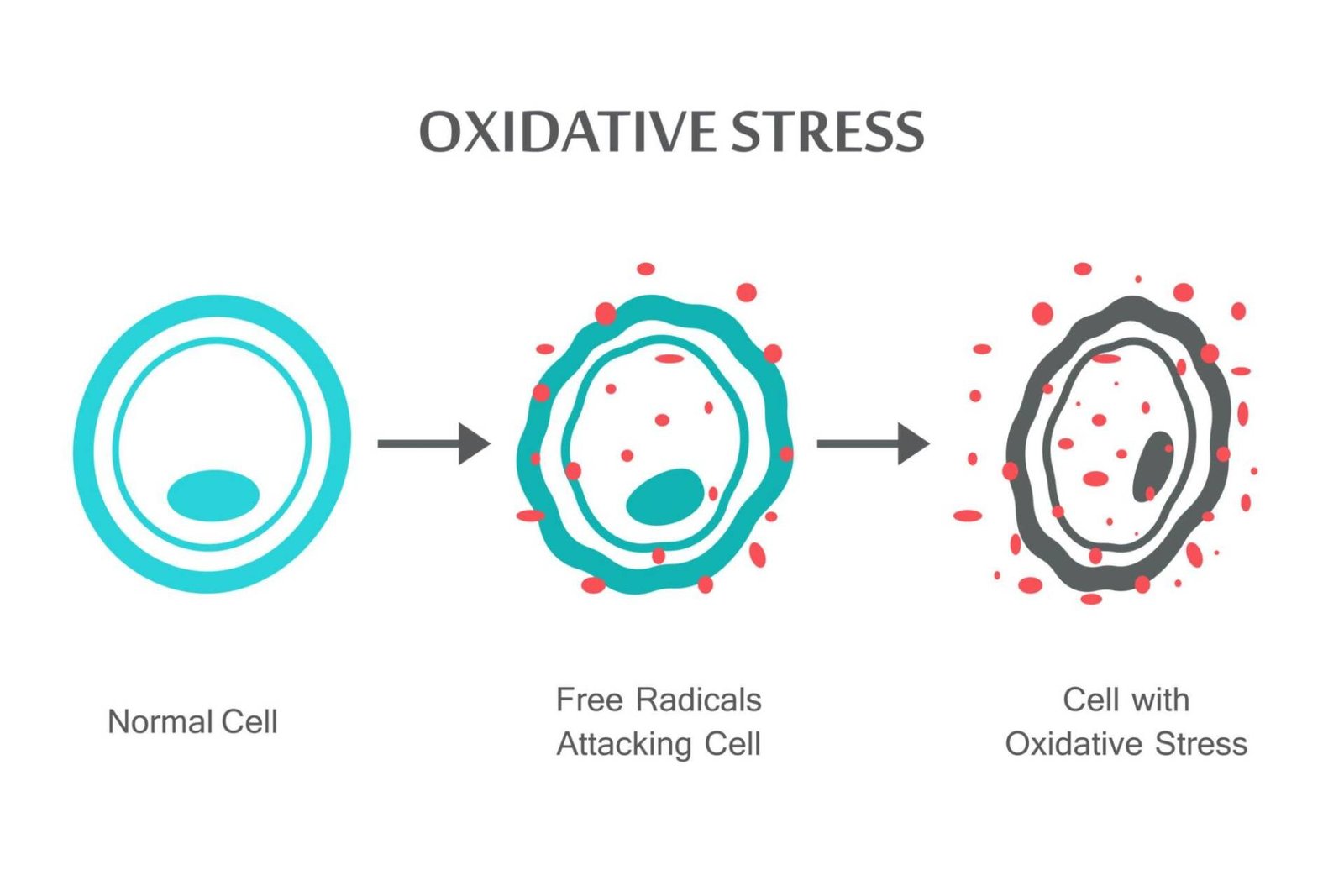The term “oxidative stress” appears in news stories about health and the environment, but few people fully understand what the term means.
Table of Contents
Oxidative stress is a slightly confusing term for many, as it involves an imbalance between two equally misunderstood substances within the human body: antioxidants and free radicals.
Oxidative stress, when not managed properly, can cause several complex problems, including slow healing, poor immunity, and even the rise of various chronic diseases. This is why people are advised to balance their free radicals by getting more antioxidants into their system.
Let’s take a closer look at oxidative stress and why it’s a problem.
Defining Free Radicals and Antioxidants
As mentioned above, oxidative stress happens to your body when you lack balance between the antioxidants and free radicals.
The free radicals in your body are one of the things causing the most damage. They’re a molecule with an uneven number of electrons, which means they can quickly react more aggressively with other molecules in the body. Free radicals can cause chemical reactions, leading to cell damage and other health issues.
Antioxidants, on the other hand, are the primary cure for free radicals. They can give an extra electron to a free radical to stabilize it without themselves becoming unstable. You have nothing to worry about if your free radical and antioxidant levels are balanced. However, if you have more free radicals than antioxidants in your system, this is where issues begin.
What’s the Problem with Oxidative Stress?

Oxidation isn’t all bad, though it can sound a little worrying. It’s an ordinary and necessary process in the human body constantly. However, oxidative stress happens when too many free radicals are in your body, and oxidation becomes problematic.
Keep in mind free radicals, when functioning correctly, can help fight off dangerous pathogens which lead to infections. Problems only occur when there are more free radicals in your system than you can reasonably keep “in balance” with antioxidants.
When allowed to grow out of control, free radicals can begin to cause various forms of damage in the body, harming fatty tissue, DNA, and proteins.
The various side effects of free radicals can lead to chronic and dangerous diseases, including high blood pressure, diabetes, heart disease, and even certain neurodegenerative diseases.
Oxidative stress can also make you age faster than usual, which is why people trying to stay young focus on getting lots of antioxidants in their diet.
While anyone can be exposed to free radicals, some people are more exposed than others, particularly those who are surrounded by cigarette smoke, radiation, and pollution.
How Do You Manage Oxidative Stress?

The good news for those concerned about the negative impacts of oxidative stress is that there are things you can do to solve the problem. While avoiding free radical exposure altogether is impossible, you can minimize the impact of oxidative stress on your body.
The best way to balance your free radicals is to increase the amount of antioxidants you consume. You can find these substances in a massive variety of food sources, particularly in fruits and vegetables.
Dark leafy greens, as are olives, cherries, berries, citrus fruits, carrots, broccoli, and tomatoes, are highly antioxidants. You can also get more antioxidants in your diet by consuming certain ingredients, like turmeric, vitamin C, vitamin E, garlic, cinnamon, and even onion.
Outside of changing your diet, the best ways to manage oxidative stress are with:
● Regular exercise: Getting plenty of activity every day is one of the best things you can do to maintain good health. A good exercise routine is associated with higher antioxidant levels and fewer problems caused by oxidative stress. Plus, exercise improves your chances of a longer lifespan.
● Reducing bad habits: Reducing bad habits, like smoking, is an excellent way to reduce your exposure to free radicals. It’s also essential to avoid sunbeds and wear sunscreen outside to protect yourself from UV light.
● Use chemicals with caution: Try to stay away from chemicals as much as possible. Reduce your exposure to cleaning chemicals, pesticides, and sources of pollution.
● Plenty of sleep: Sleep is almost as good for you as getting exercise and eating a healthy diet. The more you sleep, the more you’ll be able to maintain a good antioxidant and free radical balance, with better brain and hormone function.
● Reduce binge eating: Studies indicate that constant eating or overeating can be more likely to place you in a state of oxidative stress.
Oxidative stress is certainly not something you want to take lightly. It can cause significant damage to your body if it’s left unchecked. Get plenty of antioxidants in your diet, exercise regularly, and protect yourself from environmental factors that can increase free radical levels. Taking these steps will help ensure that oxidative stress doesn’t become a major health problem.
Supplementation with antioxidants can also help you maintain a good balance between free radicals and antioxidants in your system, so take supplements if necessary. With the right approach, you can keep oxidative stress from damaging your health and well-being.
Do Antioxidants Help Reduce Oxidative Stress?
Yes, antioxidants are essential in combating oxidative stress. They neutralize free radicals by donating an electron, reducing damage to your cells. Antioxidants like vitamin C, vitamin E, and beta-carotene can be found in many fruits and vegetables, and their regular consumption can help maintain a healthy balance between free radicals and antioxidants in the body. This improves the body’s fight against oxidative stress and associated diseases. Certain supplements can also provide a convenient way to increase your antioxidant intake. However, it’s advisable to consult with a health professional before starting any supplementation regimen.
Conclusion
In a nutshell, oxidative stress is like a battle between the good guys (antioxidants) and the bad guys (free radicals) in our body. When there’s an imbalance, trouble brews! While free radicals can be helpful in fighting off pathogens, too many of them can wreak havoc on our tissues, DNA, and proteins, potentially leading to chronic diseases.
Luckily, antioxidants come to the rescue, neutralizing those troublemakers and keeping things in check. You can find these superheroes in various foods, especially fruits and veggies, as well as in specific supplements. And hey, remember the importance of regular exercise, a balanced diet, quality sleep, and kicking those harmful habits like smoking to the curb! Of course, it’s always wise to consult a health professional before diving into any supplementation routine.
As we navigate through life, it’s crucial to understand that being proactive in managing oxidative stress is key to our overall health and longevity. It is a silent but potent threat that, if unchecked, can lead to severe health troubles. Therefore, take a moment to reflect on your lifestyle choices. Are they promoting a healthy balance between antioxidants and free radicals? If not, it’s time to make some adjustments. Incorporate more antioxidant-rich foods in your diet, embrace regular physical activity, and minimize harmful habits and exposures.
Remember, your health is your wealth, and managing oxidative stress effectively is a worthwhile investment. Do not hesitate to consult health professionals for personalized advice. Start today and make oxidative stress management a part of your journey towards a healthier, happier life.






9 Comments